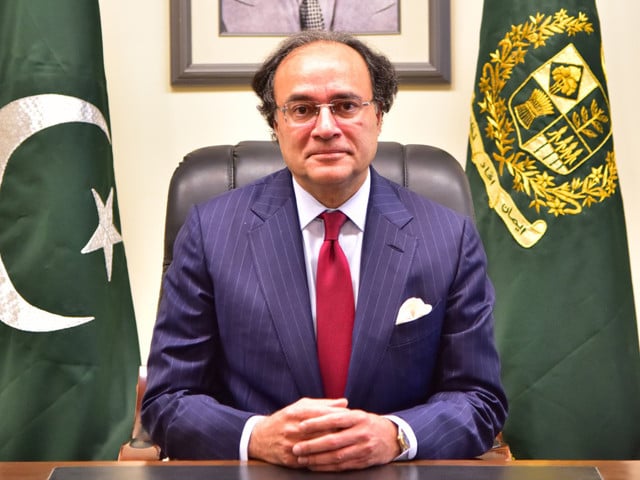Federal Minister for Finance and Revenue Senator Muhammad Aurangzeb has invited the global stakeholders “to support Pakistan’s journey by investing in priority sectors such as agriculture, Information Technology (IT), renewable energy and pharmaceutical Sectors”.
In the article published on the World Economic Forum (WEF) website, the Minister highlights the transformative journey embarked upon by Pakistan in recent years towards economic stabilization and growth, according to a press release issued here on Tuesday.
“Confronted with formidable challenges, we implemented decisive reforms to build a robust foundation for sustainable and inclusive development. Today, the results of these efforts are becoming evident, with the economy demonstrating resilience and renewed potential,” he says.
Question on the series of economic reforms, he said “I assumed office as Finance Minister in 2024, Pakistan faced severe fiscal and monetary pressures and inflation had surged to 38%, straining households and eroding purchasing power.”
The Minister said that foreign exchange reserves had dropped dangerously low, barely covering two weeks of essential imports like food and fuel and industrial output had contracted by 10.3%, and GDP growth had plummeted to 0.2%.
The compounded effects of COVID-19 and devastating floods causing over $30 billion in damages further tested our resilience.
Recognizing the gravity of the situation, “we implemented a series of necessary reforms and these included stabilizing the exchange rate, tightening fiscal policies, and curbing inflation through targeted monetary interventions. With support from the IMF’s Extended Fund Facility (EFF) worth $7 billion, we initiated structural improvements in critical sectors such as energy and taxation. Central to this effort was “Uraan Pakistan”, an economic transformation plan launched in 2024,” he said.
Watch WEF sessions: Industries in the Intelligent Age
He said that this initiative aims to achieve sustainable, export-led 6% GDP growth by 2028 through public-private partnerships, enhanced export competitiveness and optimized public finances and priority sectors include agriculture, energy, textiles, pharmaceuticals and IT.
Finance Minister said that a pivotal component of ‘Uraan Pakistan’ is our collaboration with the World Bank on a $20 billion initiative targeting health, education, poverty alleviation, investment and climate resilience.
He said that this transformative partnership addresses critical challenges such as child malnutrition, educational outcomes and clean energy adoption.
By integrating sustainability into our development framework, “we are contributing to global efforts to achieve the United Nations Sustainable Development Goals (SDGs)” he said.
The Minister said that in July 2024, we introduced a reform-oriented budget with an ambitious goal of raising Rs13 trillion in revenue a 40% increase from the previous year.
He said that these reforms focused on broadening the tax base by targeting under-taxed sectors like agriculture, real estate and trade, while leveraging technology to enhance compliance and transparency. Modernizing the Federal Board of Revenue (FBR) has been instrumental in streamlining tax administration.
Meanwhile question on the economic revival in the country, he said that today, Pakistan’s economy is on a path to recovery and inflation has dropped to 4.1%, and foreign exchange reserves now provide over two months of import coverage.
He said that goods exports have risen by 7.1%, and the IT sector has grown by an impressive 28% year-on-year. Pakistan’s global default risk has dropped by 93%, signaling renewed faith in the country’s fiscal stability.
Local and foreign investors, including global giants like Aramco, BYD and Samsung, are contributing to this economic revival, reflecting Pakistan’s potential as a lucrative investment hub.
Aurangzeb said that the current account has been in surplus for three consecutive months, and investor confidence is at a two-year high and foreign direct investment (FDI) has grown by 20% in the first half of fiscal year 2025, reflecting renewed trust in Pakistan’s economic trajectory.
He said that initiatives like the ‘Roshan Digital Account’ have attracted over $9 billion in inflows, while remittances have reached a record $35 billion this year and additionally, Pakistan’s equity market delivered an 87% return in dollar terms, underscoring strong investor sentiment.
Internationally, Pakistan’s progress has been acknowledged, with all three top global rating agencies upgrading the country’s sovereign ratings. Moody’s revised Pakistan’s economic outlook to ‘Positive’ in September 2024, recognizing the impact of our policy measure, he said.
Talking on current economic challenges , he said that despite significant achievements, challenges remain and to break free from cycles of external assistance, Pakistan is addressing structural inefficiencies in revenue collection, energy, state-owned enterprises (SOEs) and privatization.
He said that rightsizing the federal government, reforming SOEs, and fostering export-led growth will strengthen internal revenue streams and reduce reliance on international funding programmes.
The Minister said that global stakeholders are invited to support Pakistan’s journey by investing in priority sectors such as agriculture, IT, renewable energy, mining and minerals, textiles and apparels, pharmaceuticals, while capitalizing on Special Economic Zones (SEZs).
He said that Pakistan’s innovative approaches in taxation and economic stabilization offer valuable lessons for other developing economies and furthermore, partnerships in climate resilience and sustainable development are crucial for advancing shared global goals.
Finance Minister said that the cornerstone of Pakistan’s economic transformation is political will and visionary leadership and this journey is not just about overcoming challenges but about harnessing resilience, determination and collective effort.
He said that with a remarkable workforce, abundant natural resources, and immense production potential, Pakistan is poised to soar to new heights – contributing to regional stability and global economic progress.
ISLAMABAD Jan 21: Courtesy APP

